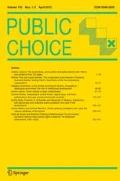Conclusions
Evidence from recent presidential elections indicates that voters behave as if they hold presidents accountable for changes in state-level economic conditions. Given the apparent political payoffs, it is almost a certainty that macroeconomic pump-priming (which affects state-level conditions on average) and certain inter-state redistributive policies would engender support from pragmatic incumbent presidents. The finding that state-level economic conditions can affect voting behavior is particularly relevant to the president already caught in an over-heated macroeconomic environment; for example, because of the peculiarities of the electoral college, Carter might improve his chances for re-election in 1980 by cutting some federal programs in Arizona and Nebraska (strong Ford states) and switching them to Illinois or Texas (closely contested states in 1976). Abolishing the electoral college and permitting popular votes to determine presidential-election outcomes would greatly reduce, if not eliminate, the president's political gains from such state-level redistributive policies.
This study's findings also suggest a potentially perverse side-effect from the Federal Election Campaign Act (FECA) as amended in 1974. By legislatively equalizing the major-parties' presidential campaign spending, FECA has removed the natural fund-raising advantage of the incumbent president — especially Republican incumbent presidents. Removing this advantage could well increase the relative importance of other vote-getting activities — for example, the manipulation of national and state-level economic conditions.
The findings for the 1972 election suggest that state-level campaign spending influences state-level voting outcomes. Since FECA has lowered major-party presidential campaign spending — which presumably has had the effect of raising the marginal productivity of campaign spending — the allocation of spending across states may be more important than ever in deciding presidential-election outcomes.
Finally, the finding that state-level economic conditions affect voting outcomes raises the possibility that earlier studies which have found voter responses to national-level conditions may actually only be measuring the influence of state-level conditions (on average). Determining to what extent voters respond to national-level economic conditions after controlling for state-level conditions must await further analysis.
References
Abrams B.A., and Settle, R.F. (1978). ‘The Economic Theory of Regulation and Public Financing of Presidential Elections.’ The Journal of Political Economy, 86 (April): 245–57.
Fair, R.C. (1976). ‘The Effect of Economic Events on Votes for President.’ Cowles Foundation Discussion Paper No. 418, Yale University. January.
Fiorina, M.P. (1978). ‘Economic Retrospective Voting in American National Elections: A Micro-Analysis.’ American Journal of Political Science, 22 (May): 426–43.
Frey, B.S. (1978). ‘Politico-Economic Models and Cycles.’ Journal of Public Economics, 9: 203–20.
Kramer, G.H. (1971). ‘Short-term Fluctuations in U.S. Voting Behavior 1896–1964.’ American Political Science Review, 65 (March): 131–43.
Meltzer, A.H., and Vellrath, M. (1975). ‘The Effects of Economic Policies on Votes for the Presidency: Some Evidence from Recent Elections.’ Journal of Law and Economics, 19 (Dec.): 781–98.
Newspaper Enterprise Association. The World Almanac and Book of Facts. New York: Newspaper Enterprise Association, selected years.
Palda, K.S. (1976). ‘The Effect of Expenditure on Political Success.’ Journal of Law and Economics, 18 (Dec.): 745–71.
Stigler, G.J. (1973). ‘General Economic Conditions and National Elections.’ American Economic Review, 63 (May): 160–67.
Tufte, E.R. (1978). Political Control of the Economy. Princeton: Princeton University Press.
U.S. Bureau of the Census. (1975). Statistical Abstract of the United States. Washington: Bureau of the Census.
U.S. Congress, Committee on Commerce. (1973). Federal Election Campaign Act of 1973: Appendix A. Hearings before the Subcommittee on Communications on S.372, 93d Cong., 1st sess.
U.S. Department of Labor. (1963). Manpower Report of the President. Washington: GPO.
Weatherford, M.S. (1978). ‘Economic Conditions and Electoral Outcomes: Class Differences in the Political Response to Recession.’ American Journal of Political Science, 22 (Nov.): 917–38.
Wright, G. (1974). ‘The Political Economy of New Deal Spending: An Econometric Analysis.’ Review of Economics and Statistics, 56 (Feb.): 30–38.
Author information
Authors and Affiliations
Additional information
This paper was written while the author was a National Fellow at the Hoover Institution, Stanford University. The author wishes to thank Doris Abrams, John Hause, David Mayhew, and Gordon Tullock for helpful comments and Tamra Ritchey for collecting data used in this study. All remaining errors are the sole responsibility of the author.
Rights and permissions
About this article
Cite this article
Abrams, B.A. The influence of state-level economic conditions on presidential elections. Public Choice 35, 623–631 (1980). https://doi.org/10.1007/BF00140090
Issue Date:
DOI: https://doi.org/10.1007/BF00140090

